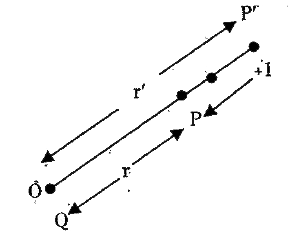Derive an expression for the electric potential due to a point gharge .
Consider a point charge Q at .O. and a unit positive charge is placed at .p. distance .r. The force acting on it is
→F=14πε0q(r)2along−−→OP
Let dW be the work done in moving this test charge through dr. towards .O..
∴dW=→F.→Fr.=−14πε0Q(r.)2Δr.(∵0=180∘)

The total work done in bringing this test charge from r.=∞ to r.=r is
W=r∫∞dW=−Q4πε0r∫∞1(r.)2dr.=−Q4πε0[−1r.]r∞⇒W=14πε0Qr
By the definition of potential this workdone is the electrostatic potential at that point .
∴V=1.4πε0⋅Qr
Similar Questions
Derive an expression for the electric potential at any point along the axial line of an electric dipole.
View SolutionDerive the expression for the electric potential at any point along the axial line of an electric dipole.
View SolutionDerive the expression for the electric potential at any point along the axial line of an electric dipole.
View SolutionDeduce an expression for the electric potential due to an electric dipole at any point on its axis. Mention one contrasting feature of electric potential at a point due to dipole as compared to that due to a single charge.
View SolutionDeduce an expression for the electric potential due to an electric dipole at any point on its axis. Mention one contrasting feature of electric potential of a dipole at a point as compared to that due to a single charge.
View SolutionWhat is an electric dipole and electric dipole moment? Derive an expression for electric potential at any point due to an electric dipole. Also discuss the special cases.
View SolutionDerive an expression for electric intensity E due to a uniformly charged thin spherical shell at a point outside the shell.
View Solution(i) Derive the expression for the specific for the electric potential due to an electric dipole at a point on its axial line.
(ii) Depiet the equivpotential surfaces due to an electric dipole.
View Solution(a) Obtain the expression for the potential due to a point charge.
(b) Use the above expression to show that the potential, due to an electric dipole (length 2a), varies as the inverse square' of the distance r of the 'field point' from the centre of the dipole for r>a.
View Solution(a) Obtain the expression for the potential due to a point charge.
(b) Use the above expression to show that the potential, due to an electric dipole (length 2a), varies as the inverse square' of the distance r of the 'field point' from the centre of the dipole for r>a.
View Solution
